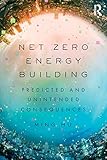Net zero energy building : predicted and unintended consequences Ming Hu
Publication details: London : Routledge, c2019.Description: xvii, 161 p. : maps, ill. ; 25 cmISBN:- 9780815367802
- 720.472 HU NE
| Item type | Current library | Call number | Status | Notes | Date due | Barcode | |
|---|---|---|---|---|---|---|---|
| REGULAR | University of Wollongong in Dubai Main Collection | 720.472 HU NE (Browse shelf(Opens below)) | Available | Nov2019 | T0063128 |
Browsing University of Wollongong in Dubai shelves, Shelving location: Main Collection Close shelf browser (Hides shelf browser)

|

|

|

|

|

|

|
||
| 720.285 WE DE Design games for architecture : | 720.47 HO GR Greening the urban habitat : | 720.47 JA GR Green and smart buildings : | 720.472 HU NE Net zero energy building : | 720.483 JO PE Performative skyscrapers : | 720.483 TA TA Tall building design : | 720.68 OS HA Handbook of practice management |
What do we mean by net-zero energy? Zero operating energy? Zero energy costs? Zero emissions? There is no one answer: approaches to net-zero building vary widely across the globe and influence by different environmental and cultural contexts.
Net Zero Energy Building: Predicted and Unintended Consequences presents a comprehensive overview of variations in 'net zero' building practices. Drawing on examples from countries such as the United States, United Kingdom, Germany, Japan, Hong Kong, and China, Ming Hu examines diverse approaches to net-zero and reveals their intended and unintended consequences.
Existing approaches often focus on operating energy: how to make buildings more efficient by reducing the energy consumed by climate control, lighting, and appliances. It goes beyond this by analysing overall energy consumption and environmental impact across the entire life cycle of a building―ranging from the manufacture of building materials to transportation, renovation, and demolition. Is net-zero building still achievable once we look at these factors?
With clear implications for future practice, this is key reading for professionals in building design, architecture, and construction, as well as students on sustainable and green architecture courses.
There are no comments on this title.
